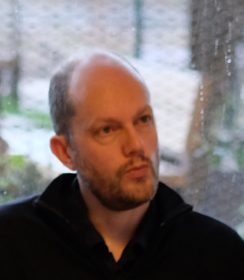 Jonathan Rutherford soutiendra son habilitation à diriger les recherches le lundi 24 juin 2019, 14h00 (salle A202, bâtiment Bienvenüe)
Jonathan Rutherford soutiendra son habilitation à diriger les recherches le lundi 24 juin 2019, 14h00 (salle A202, bâtiment Bienvenüe)
Le jury est composé de :
- Sabine Barles, professeur, Université Paris 1 Panthéon Sorbonne
- Olivier Coutard, directeur de recherche CNRS, LATTS (garant de l’habilitation)
- Cyria Emelianoff, professeur, Le Mans Université
- Andrew Karvonen, associate professor, Urban & Regional Studies, KTH Royal Institute of Technology, Stockholm (Suède)
- Roger Keil, professor and chair in global sub/urban studies, York University (Canada)
- Timothy Moss, senior researcher, Humboldt Universität zu Berlin (Allemagne)
Manuscrit inédit
Redeploying Urban Infrastructure: The Politics of Urban Socio-Technical Futures
The manuscript explores urban futures in the making, as seen through the lens of urban infrastructure. It describes how socio-technical arrangements of energy and water provision are being recast in continuing efforts towards realising ‘sustainable’ transformation of cities. It critically investigates how infrastructure comes to matter by analyzing the shifting capacities and entanglements of diverse actors with these systems, the various means they use to envision, enact and contest changes, and the wide-ranging social and political implications of emerging infrastructure transitions. Drawing on original research into urban infrastructure debates and projects in Stockholm and Paris, it develops a novel conceptual framework for studying and acknowledging the active, vital role of infrastructure in constituting a material politics of urban transformation.
Le manuscrit explore les futurs urbains en devenir, à travers le prisme des infrastructures urbaines. Il analyse la manière dont les arrangements sociotechniques pour la fourniture de l’énergie et de l’eau se refont dans le cadre des efforts continus visant à réaliser une transformation « durable » des villes. Il examine de manière critique comment les infrastructures sont importantes en analysant les capacités et les enchevêtrements dynamiques d’acteurs variés avec ces systèmes, les divers moyens qu’ils utilisent pour envisager, mettre en œuvre et contester les changements, ainsi que les implications sociales et politiques des transitions infrastructurelles émergentes. S’appuyant sur des recherches originales sur les débats et projets autour d’infrastructures urbaines à Stockholm et à Paris, il élabore un cadre conceptuel pour étudier et reconnaître le rôle actif et vital des infrastructures dans la constitution d’un politique matériel de la transformation urbaine.





